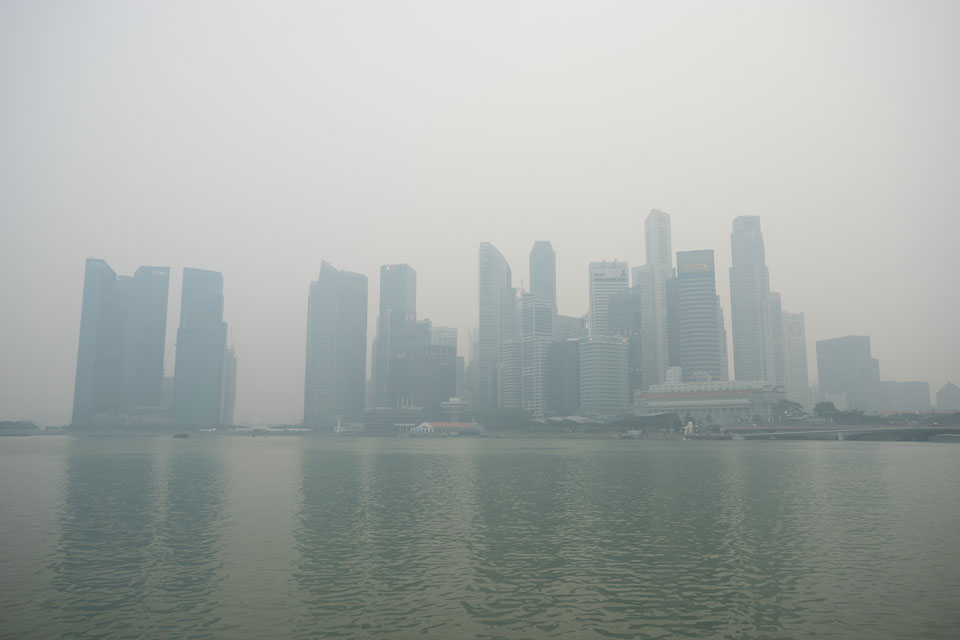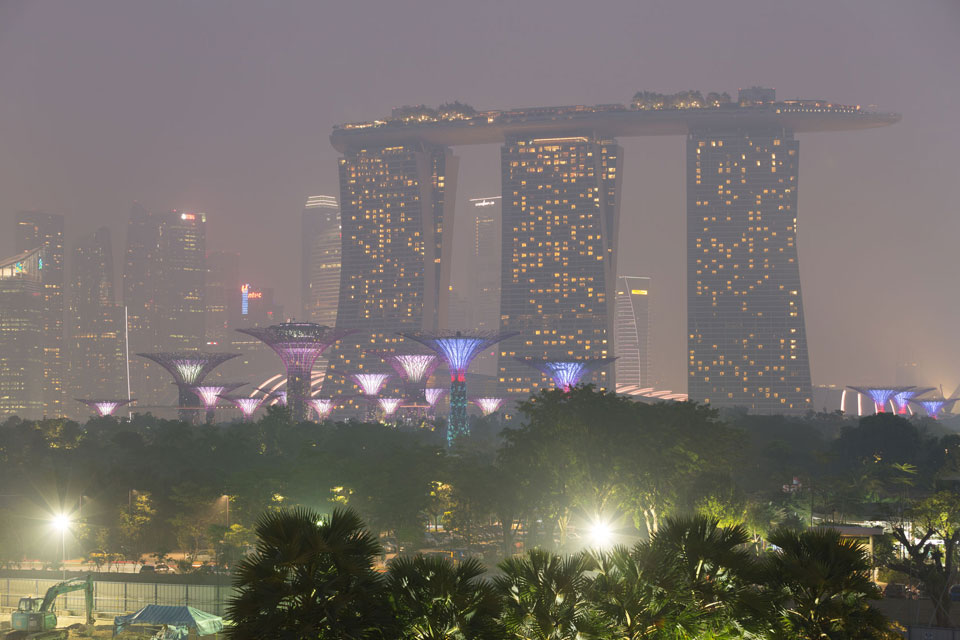Raise your hand if you’re of the opinion that even well-mannered runners are capable of having meltdowns when they learn that environmental conditions are bad enough to put a Singapore mass running event on hold.
We feel your pain. Fact is, haze is no stranger to Southeast Asia and the dense air can become particularly hazardous when there’s no wind to drive it away.
Recall the recent Indonesian haze that hovered over the region and threatened to cancel high-profile events like the PUMA Night Run and SAFRA Singapore Bay Run & Army Half Marathon scheduled for 27th and 28th August.
Run organisers posted a frenzy of notices on event websites and for a time, it looked as though both races would be cancelled or at least made some drastic changes.
Fortunately, the air cleared up and both events took place, but if you were among the participants who went ballistic at the thought either might be cancelled at the last minute, this article is aimed at you.
Two months a year
When avid runner Geoffrey moved to Singapore from London, he joked that he was trading one place with air pollution for another, but he hadn’t a clue how much worse air quality would be in his new home.
He quickly repaired to the Internet, thinking that if he was going to complain about the air, he may as well know what’s behind the sultry haze that hangs over the city and prompts myriad health warnings.
Geoffrey learned that Indonesian farmers use antiquated methods to slash and burn crops in late summer/early fall to prepare the land for next year’s planting. This ancient agricultural land renewal method is ten times cheaper than investing in farm equipment, so it’s easy to see why rural farmers with little money fall back on the practice.
The thick, choking smoke originating in farmer’s fields settles over the land like a vast blanket covering Singapore, and until brisk winds push it out to sea, Singaporeans have little choice but to stay indoors until it dissipates.

Plenty of blame to go around
Informed runners like Geoffrey learn that an immediate solution to Singapore’s haze problem isn’t likely and he came to the conclusion that farmers aren’t the only guilty parties: international corporations contribute mightily to haze inundation.
Specifically, the region’s lucrative palm oil, pulp and paper industries demand more and more production. Paired with El Nino climate changes and farm fires, this vicious cycle continues.
Scientists measure haze in hundreds of kilometres. The problem has become so widespread, around 500,000 people die of respiratory disease each year, according to Indonesian government statistics.
Once haze settles over the land, many aspects of Singapore life are impacted: airline cancellations, school closures and in some dramatic cases, towns and cities literally shut down because the Pollutants Standards Index (PSI) that measures air quality shows readings of above 100 (unhealthy) and above 300 — considered hazardous.
Add to the toxic mix particulate matter consisting of sulphur dioxide, carbon monoxide, nitrogen dioxide and ozone and the air in Singapore becomes doubly hazardous.
Particulate levels that surpass PM2.5 are powerful enough to trigger serious respiratory illnesses and even long-term lung damage. While lawmakers are working hard to find solutions, this environmental problem isn’t going away any time soon.

What’s a runner to do?
You’ve planned for it. Trained for it. Sacrificed for it. Perhaps you’ve even set aside personal or work travel to participate in a Singapore running event, then shortly before the event flags off, a haze alert is sounded throughout the land.
You’re mad. Really mad. Maybe you take your frustration out on the world by using social media to broadcast nasty comments about the unfairness of having a race likely to be called off due to a haze alert or you unload on members of your running club or perhaps your family.
Problem is, you’re preaching to the choir! Everyone in your world already knows how disappointed, unhappy and mad you are — many of them likely feel the same, but not everyone reacts with bursts of anger, irrational blame placing or acting out in other inappropriate ways.
Can anger change a situation like haze settling over the country? Not really. Such outbursts just make people look immature and irrational.
What should a runner do when these situations arise? Professionals say that instead of giving in to infantile emotions when that haze notice pops up on a event website, it’s important to come to grips with why you’re feeling this way, because it likely won’t be the first time you react negatively to the threat of an event being called off, particularly in late summer when haze conditions become a fact of life.

How to cope
Is your personal reaction to the possibility of an event cancellation due to your own temperament, or do you believe that Singapore society is collectively so tightly wound, it’s normal for runners to feel angry, disgruntled and disappointed at the suggestion of a potential race cancellation?
Fact is, we are a competitive people and there’s no denying that some of us could stand to be more understanding and tolerant. So chalk up a little of your knee-jerk response to the pace at which we live and move on to the way you’re wired.
According to author Donna Labermeier, when you react irrationally to a haze warning, your control mechanisms kick in. You made all of those plans, you’re mad and your temperament needs time to catch up with this change.
First reactions are gut reactions. You don’t think about the fact that Singapore health officials or event organisers are concerned about your health and don’t want you to take a risk that could have lifelong consequences. Adopt this reasoning and you could move past that gut reaction stage quickly.
Further, there’s a chance that you’re reacting for no reason. Haze alerts are regularly lifted in time for the flag off thanks to air quality improvements near the start time, so learning to practice the Zen of thoughtful waiting could save you from the negative energy you generate for no reason.
Think back to the recent Puma Night Run and SAFRA Singapore Bay Run & Army Half Marathon. Despite all warnings, both were staged. Had either been cancelled, that’s when it’s appropriate to react. Nobody wants to feel that all that hard work was for nothing!
Need a scapegoat?
Many runners confronted with the possibility that a race is going to be cancelled due to a haze alert need someone to blame. It’s just the way they think. The most commonly scapegoated people? Event organisers. Follow social media and you’ll find that some runners are great at laying blame at the feet of the people who are staging the race, resorting to name calling and empty threats.
Does this make sense? Can you think of a single way marathon organisers benefit from an event cancellation? If you’ve helped organise a race, you know success depends upon a thousand details and after all of that hard work, race postponement or delays affect organisers as much as they impact you.
In fact, organisers regularly lose sleep over just such situations, which is why you are always asked to sign a disclaimer when you register for a race that informs you that the organiser can’t be held responsible for weather-related circumstances.
Further, organisers use every media and communications conduit at their disposal to keep race participants in the loop: press releases, social media, SMSes and website updates that are posted so frequently, you might think they’re not doing anything else.
Truth is, organisers are perpetually swamped at this point. They’re liaising with authorities, stakeholders and other critical parties. It’s physically impossible to keep every participant personally informed; if they could, they would!

8 Proactive measures to take when Singapore is under a haze warning
- Use your at-home fitness equipment or head for the gym to maintain the conditioning programme you put into place in preparation for the race.
- Stop complaining and make lemonade of lemons. Perhaps, if the race flagged off at its pre-set time, you might not perform as well as you hoped. This rationalisation does make sense!
- Monitor bulletins on the event website, weather service and other information conduits. Adopt active monitoring habits so you take some ownership for staying abreast of frequent updates.
- Become a masked warrior so you’re not prisoner in your home or office when haze descends over Singapore. Protective masks are the ultimate protection.
- If you choose not to run, badgering organisers about your refund when things are chaotic simply makes no sense? This irresponsible behaviour makes you look immature and Singapore’s running community suffers, too. Instead make arrangement to collect your race medal as memento and your race pack if you have not done so.
- Set a high standard for yourself. Think of how you look to others if you’re unreasonable and demanding, insisting that organisers cancel the event because you deem it unsafe. This selfish, self-centred thinking casts the entire Singapore running scene in a bad light and changes absolutely nothing.
- Spend a little time thinking about how you can be a conduit of change. Whether you decide to act as a go-between, soothing frayed nerves and calming reactionaries or you just do what you can to calm potentially volatile reactions, your influence and the example you set can be invaluable.
- Have a talk with yourself. Are you really frustrated because you may not be able to run the marathon you’ve looked forward to or is something else nagging at you and the potential cancellation is triggering that underlying cause? You might be surprised what you uncover simply by chatting with yourself!
What advice would you give to Singapore runners who have short fuses when it comes to haze alerts that threaten to cancel their upcoming events?




